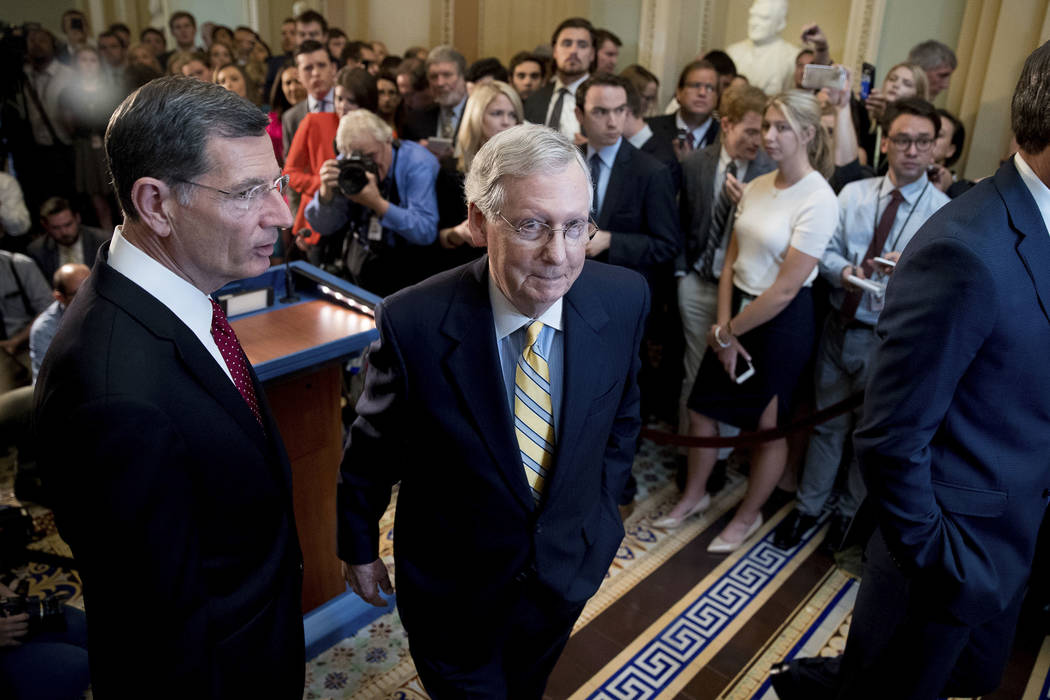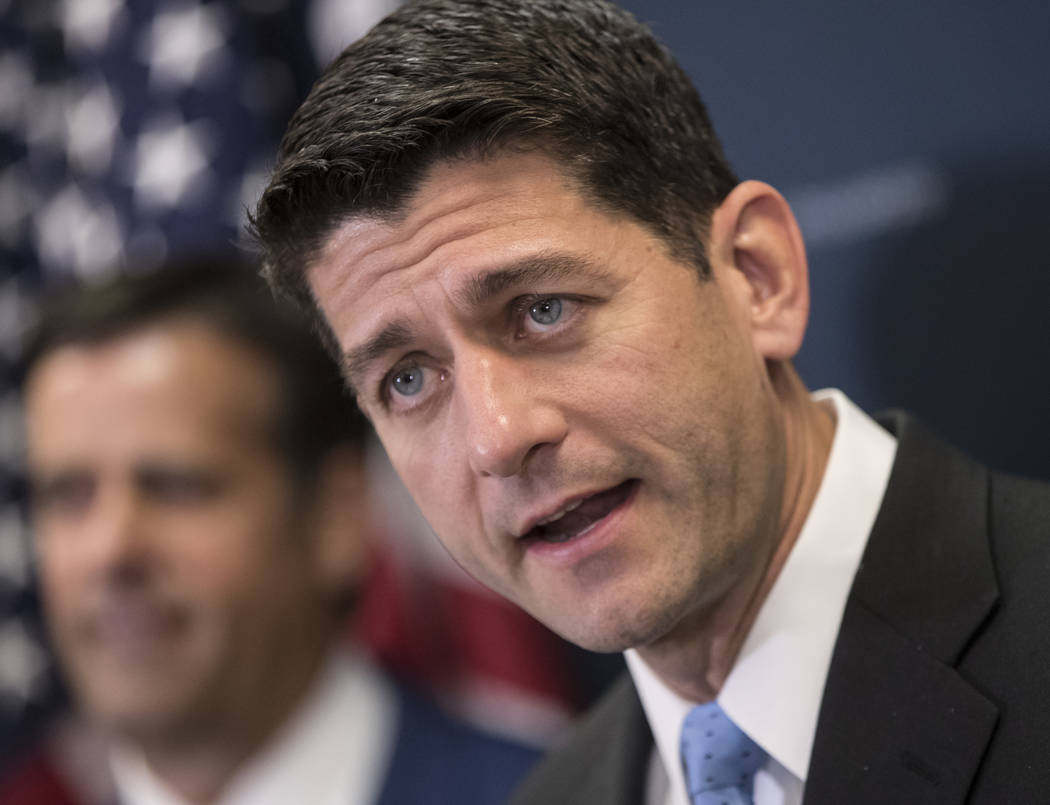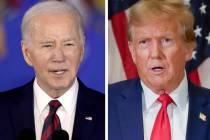Facing defections, Senate GOP leaders delay health care vote
WASHINGTON — Amid intra-party bickering, defections and complaints, Senate Republican leaders on Tuesday delayed a vote to repeal and replace Obamacare to avoid embarrassment and further tinker with the legislation.
A growing number of moderate and conservative Republican senators said they would not vote to move the bill to the Senate floor where leaders had hoped to pass the controversial proposal this week with a simple majority vote.
And a flashpoint in that growing opposition was an attack ad against Sen. Dean Heller, R-Nev., launched by a GOP super-Political Action Committee.
Heller announced last week that he would not support the Senate bill because Medicaid cuts would leave tens of thousands of Nevadans without coverage and shift costs to the state.
In a Republican luncheon at the Capitol, some GOP lawmakers denounced the attack on Heller and voiced concern about retaliation for opposition to a bill that they considered deeply flawed.
The luncheon was attended by White House Chief of Staff Reince Priebus and Steve Wynn, the Las Vegas casino developer and owner and Republican National Committee finance chairman.
After the meeting ended, Senate Majority Leader Mitch McConnell, R-Ky., announced he had pulled the bill from consideration.
“We will not be on the bill this week, but we will still be working to get at least 50 people in a comfortable place,” McConnell said.
The delay was a setback for GOP leaders and President Donald Trump, who has yet to record a major legislative victory since taking office.
Heller joined GOP senators who went to the White House following the luncheon to meet with Trump.
“We’ll discuss health care. We really have no choice but to solve the situation,” Trump told reporters before the closed-door meeting at the White House. “Obamacare is melting down. Rates are going up.”
GOP to keep working
Following the White House meeting, McConnell said the bill was not dead, and that GOP lawmakers would continue working to appease concerns on Medicaid and Medicaid expansion.
“We’re not quite there, but I think we’ve got a really good chance of getting there. It’ll just take us a little bit longer,” McConnell said.
A vote could come after the July 4th recess.
Senate Democratic Leader Chuck Schumer, D-N.Y., said the delay was not an accomplishment for Democrats, adding “we are not sitting on our laurels.”
He said he expected McConnell to “buy off” senators with program funding and other measures in the coming weeks to pass a bill that would eliminate mandates in the Affordable Care Act, commonly known as Obamacare, that expanded insurance coverage.
“We do not believe the wealthy people in America need a tax break,” Schumer said.
Outside the Capitol, groups gathered to protest the Senate GOP health care bill that included deep cuts to Medicaid, defunded Planned Parenthood and offered tax credits to purchase coverage plans.
GOP leaders suffered a blow earlier this week when the nonpartisan Congressional Budget Office released an analysis that showed the Senate bill would result in 22 million without coverage in 2026, while reducing federal deficit spending by $321 billion over the same period.
Governors in states that expanded Medicaid, including Brian Sandoval, a Nevada Republican, oppose the Senate bill and cuts to Medicaid, which was expanded to cover an additional 11 million people nationally under Obamacare.
In Nevada, more than 200,000 people gained insurance coverage under Medicaid expansion, a fact noted by Sandoval and Heller in their opposition to the Senate bill.
‘The un-health care bill’
On Tuesday, Gov. John Kasich, R-Ohio, and Gov. John Hickenlooper, D-Colo., criticized the bill to reporters at the National Press Club. Kasich urged the Senate to reject the legislation because of the Medicaid funding cuts.
So did Hickenlooper. He called the bill “a bad joke.”
“We’re calling this the un-health care bill,” said Hickenlooper, who like Kasich complained that the Senate bill would shift costs to states.
Following Heller’s announcement last week that he could not support the bill, America First Policies, a pro-Trump super PAC, announced it would begin airing ads against the Republican considered one of the most vulnerable GOP senators in 2018. Heller is running for re-election in a state that voted for Hillary Clinton in the 2016 presidential election.
Heller mentioned the attack ads against him during the meeting at the White House. Following the meeting, Heller issued a statement:
“Obamacare has led to rising costs and limited options in Nevada, we can and must do better. The current bill, however, isn’t the answer because it doesn’t do enough to reduce health care costs for families and would leave 200,000 Nevadans without the health insurance they have today.”
The tipping point for GOP leadership came after Sen. Susan Collins, R-Maine, a moderate, announced she would not vote to move the Senate bill to the floor. Republicans hold a slim 52-48 majority in the Senate.
In addition to Heller and Collins, conservatives in the Senate also opposed moving forward on legislation that they said was too liberal and did not cut costs and all Obamacare mandates.
Sen. Mike Lee, R-Utah, on Tuesday joined Sen. Rand Paul, R-Ky., and Sen. Ron Johnson, R-Wis., who said they would not vote to proceed on the bill.
Sen. Ted Cruz, R-Texas, also opposed the bill but did not publicly disclose whether he would block the bill from moving forward.
Contact Gary Martin at 202-662-7390 or gmartin@reviewjournal.com. Follow @garymartindc on Twitter.
RELATED
Nevada schools say Medicaid cuts would hit their budgets, too
CBO analysis: Senate health bill would leave 22M uninsured
Heller talks of effort to spare Nevadans from deep Medicaid cuts
Senate Republicans unveil Obamacare replacement, but run into opposition






























